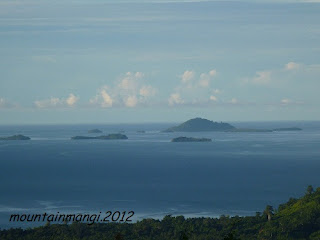For the three weeks, I was doing social survey in Megusa
village, Henganofi District of Eastern Highlands Province. At first when I heard of the location I was
reluctant to join the team, because the
Henganofi area is known for tribal fights and I would not like to be caught up
in one. Soon after a week of training on
how to use Ipads to do data entry we were off to Megusa village for a trial run
on the survey. I was used to the normal
paper interviews or data collection and entry into the computer later. The Ipad
system was a very new technique and I was eager to see how it will work. I also
could not wait to use an Ipad for the first time.
We had a big impact on the first day in the village. The villagers
were very interested with the Ipads and the vehicle that we got was a classic.
It was the latest Land Rover in town and the first one in the province. Out
from the Bird of Paradise Pool Side car park, around town and on the highway,
all eyes were on us. By standers and passer-by’s were staring at the car and of
cause wanted to see who is driving or inside, and (I guess one would hope in if
we stopped and allow them to…hahaha!). An elderly man whom we gave a lift from
the junction to the village said he admired the vehicle when he saw it on the advertisement
paper, and dreamt of seeing it one day in town. The vehicle coming into his
village and having a ride on it was something he never dreamt of, and was very very
happy. I’m sure this was really satisfied because he gave us words of blessing almost
20 times.
Back to work, the social work there was very intense,
starting as early as 6am and ending around 12 midnight. I found out that dealing
with animals and plants was something very different from dealing with people,
and it is very sensitive. How you direct your questions and give feedbacks is
the key to progress and success. The first few days were a struggle, but I
managed to get through.
After my three weeks was up, I was asked to extend my time
with the team, which I was willing to do. However, I was called out to join
another project on Manus Island. This time switching from Social Back to
Biological and from People subjects to Frogs. I was summoned to assist another
female colleague from PNG Institute of Biological Research, working on the effects of climate change on six endemic frog
species of Manus Island.
It was sad to leave a team after 3 weeks with them. But I was
out from Megusa village on Friday. Planned do my laundry and get packed for
Manus on Saturday, but I had to attend to urgent important matters. So I spent
my Saturday in office. Sunday morning flight I was on my way to Manus via Port
Moresby with my colleague. Stepping out of the plane at Jacksons airport I
could already feel the heat, a step out the terminal and I was sweating, I
could feel sweat washing down the dirt on me and a little breeze from the palms
at the car park blowing off the my body odour which has been accumulating for
the last 5 days.
A night in Pom, and we were in Manus the next. Though I had
a good bath in Moresby, my 2 weeks grubby field laundry was still with me. Manus
has its own temperature which is much higher than that in Port Moresby. For a
person like me arriving from a cold part of the country, a five minute walk got
me sweating like walking in the rain.
Manus is a beautiful small island with friendly people. Lorengau has not changed after three years, my
first visit was with a team from Wildlife Conservation Society to work on a
REDD project. After a night in Lorengau,
we were off to the study site. The study site was the highest mountain - Mt Ndemsel,
standing in the heart of the Island and reaches its peak at 700 meters. We
accessed the mountain from the Southern part of the Island, from Pelipowai
village which is about 3 hours by boat. The village stretches about a kilometre
along the coast with houses about 5 meters from the see. The day ends by going to bed with the sound
of the waves and starts with the waking call of the Island’s endemic Friarbird
(Philemon albitorques), which they locally
call “Manus Chauka”. A night at Pelipowai and off we climbed the mountain with
local helpers and potters. The locals were fast and made it an hour and half
before me and my colleague, which took us about 5 hours to reach the camp site
which is 5 minutes away from the summit. It was a gradual climb, but the heat
and load slowed us.



No comments:
Post a Comment